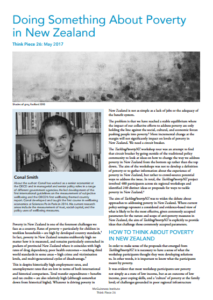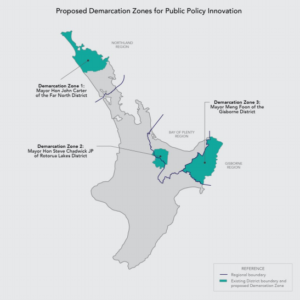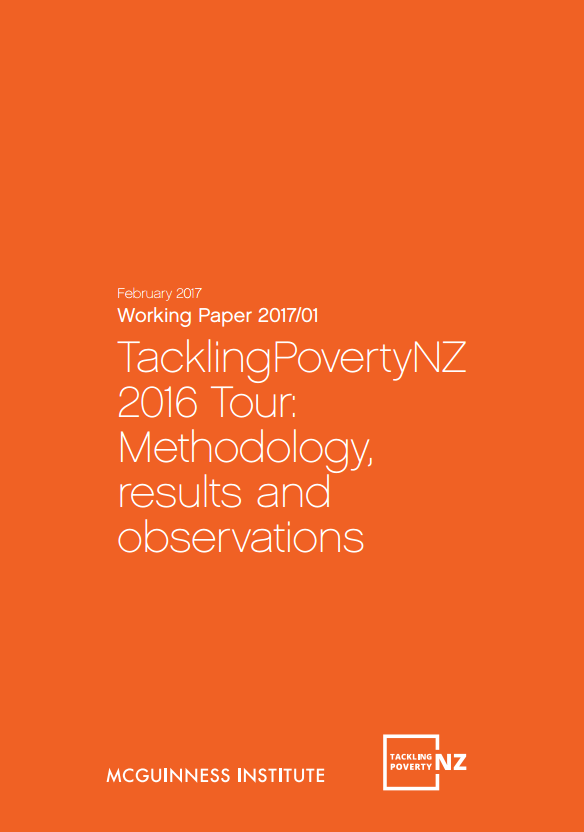The McGuinness Institute was invited to speak on Friday 12 May to discuss the results of the 2016 TacklingPovertyNZ tour at the 2017 Community Boards Conference. The session presented Working Paper 2017/01 – Tackling PovertyNZ Tour: Methodology, results and observations to community board members, who were invited to look at the unique challenges of poverty that exist within different communities and contribute to the conversation with their own insights. The slideshow we presented at the conference can be viewed below.
Once every two years Local Government New Zealand (LGNZ) holds a Community Boards Conference that brings together community board members from across the country for a three-day workshop. This year the conference took place in Methven from Thursday 11 May to Saturday 13 May. The theme was “Making 1 + 1 = 3”, with a focus on how boards can achieve more for their communities with the resources they are given. The conference also invites speakers to engage with the challenges of 21st century communities and the role of boards within them. Speakers discussed the rapidly changing shape of communities as emerging global and local events present risks to traditional forms of community (e.g. the impact of technology on social networks). The conference is a chance for community boards throughout New Zealand to learn and engage with one another, discussing common issues and sharing strategies for building resilience and cohesion within communities.
It was inspiring to see the dedication and hard work of community board members throughout New Zealand, and it was a pleasure to hear responses from those who took part in the workshop.
About the TacklingPovertyNZ 2016 tour
The 2016 tour was a response to a 2015 three-day workshop that brought together 36 participants aged 18 to 25 representing a diverse range of backgrounds from throughout New Zealand. Participants found that ‘assuming that one solution will work everyone indicates a failure to address cultural disparities and injustices, and an ignorance of the diversity of our population’. The purpose of the 2016 tour was to build and share ideas on how to tackle poverty, come up with local solutions and connect like-minded people within communities.
The Institute organised six workshops throughout New Zealand in Queenstown, Manawatu, Rotorua, Gisborne, Kaikohe and Kaitaia. Working Paper 2017/01 – Tackling PovertyNZ Tour: Methodology, results and observations brings all the outputs from the six workshops together and aims to illustrate the diverse range of challenges and opportunities existing in communities.
Outputs from 2017: Think Piece 26: Doing Something About Poverty In New Zealand
The Community Boards Conference presented an opportunity to launch Think Piece 26: Doing Something About Poverty In New Zealand written by Conal Smith that has now been published on our website. The think piece discusses what can be done to address poverty in New Zealand through seven proposals. The seven  proposals reflect themes or suggestions that were repeated across the workshops, and which, if implemented, would represent a significant change in how New Zealand addresses poverty.
proposals reflect themes or suggestions that were repeated across the workshops, and which, if implemented, would represent a significant change in how New Zealand addresses poverty.
These proposals are to:
- simplify and standardise the benefit system,
- introduce special demarcation zones in regions of high need,
- revisit the role of the State as employer of last resort,
- apply a social investment approach to investment in ‘hard’ regional infrastructure,
- invest significantly in mental health,
- target the behavioural drivers of poverty, and
- introduce asset-based assistance to high-risk children.
Proposal to the Rt Hon Bill English on Demarcation Zones for Public Policy Innovation

The second proposal in the think piece draws on the work we did at the end of 2016 in the Proposal to the Rt Hon Bill English on Demarcation Zones for Public Policy Innovation.
Published in December 2016, the proposal is a response to the entrenched forms of poverty we found on the TacklingPovertyNZ tour. The demarcation zones are instruments of public policy that aim to tackle poverty and build economic wealth in three zones.
We consider Meng Foon, Hon John Carter and Hon Steve Chadwick JP, mayors in Gisborne, the Far North and Rotorua respectively, to be well placed to lead the three proposed demarcation zones. Each area would develop its own ways of moving forward. See image on the right for the proposed zones.
In 2017 we would like to build on these findings. There was a lot to learn and digest, and we are still working through what this means in terms of public policy.
To stay up to date with Project TacklingPovertyNZ, subscribe to the newsletter here.

